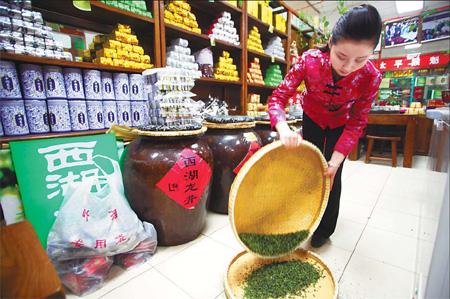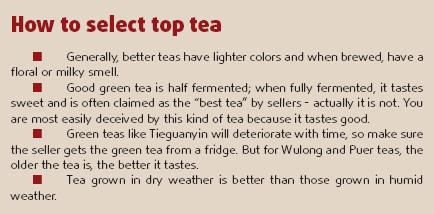
A saleswoman selects tea leaves at Maliandao tea market yesterday. Recent reports claim the market is abuzz with scams. [China Daily]
Vendors 'reap huge profits' by selling substandard goods at Maliandao
Vendors at Maliandao, the largest tea market in north China, are reaping huge profits by selling substandard tea, according to claims from a non-governmental organization.
A survey done by a member of the Chinese People's Political Consultative Conference in Xuanwu district showed that almost half of customers believe Maliandao is rife with scams. And 84 percent of tea shop owners would like the government to crack down on the area.
Cai Haijin, a former owner of a tea shop in Fujian who dealt with Maliandao, Xuanwu district, said the tea business is very profitable.
"Tea in Maliandao is generally cheaper than brand stores like Tenfu (a tea shop chain from Taiwan), but it is still twice as expensive as in Fujian province," said Cai, who was born in Anxi, Fujian - home to the renowned tea Tieguanyin.
Cai told METRO yesterday that distributors can purchase tea in Fujian for 120 yuan per 500 g and sell it for 250 yuan or even higher in Maliandao.
Maliandao is home to 11 tea shopping centers and more than 1,200 shops. It has an annual revenue of more than 2 billion yuan, the Beijing Evening News reported.
But the market is known for being a tough place to shop if you don't know your product.
Wang Yinyun, a shopkeeper in Maliandao Tea City who has been in the business for eight years, said most customers are purchasers who buy tea for companies.
She said 70 to 80 percent of the tea city's revenue comes from Tieguanyin, followed by Longjing and Pu'er tea.
The first question a customer is normally asked is: "what class of tea would you like?" This is how tea is classified, Wang noted.
She said experts can determine the quality of tea by looking, touching and tasting it. But amateurs are at the mercy of the sellers.
"There is no 'fake' tea, only substandard tea," Zhang Xi, general manager of Maliandao tea city, was quoted by Beijing's official news website Qianlong.com as saying.
"We are trying our best to stop price scams by doing a monthly check on 30 randomly selected tea shops."
Unusually, there have been no complaints of substandard tea in Maliandao, according to the Xuanwu district industrial and commercial bureau.
"It's hard for a customer to realize they have been deceived," Liu Yingdong, a regular customer to Maliandao told METRO.
"Only experts can tell the class of a tea by sight," a shopkeeper from "Guanyinwang" tea shop told METRO. "When the qualities of different teas are very close, it's hard to tell the difference between one worth 160 yuan, 240 yuan, or 380 yuan."
"From only a quick conversation, the seller can tell if you really know tea or not," warned Wang Gang, a regular customer to the market.






